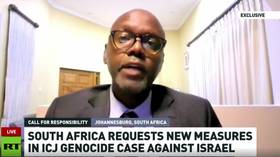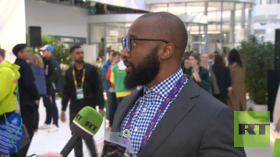South Africa wants ‘end of genocide’ in Gaza – presidential spokesman (VIDEO)

The South African government has asked the International Court of Justice (ICJ) for additional measures to resolve the humanitarian disaster in Gaza, Vincent Magwenya, spokesman for President Cyril Ramaphosa, told RT in an exclusive interview.
Speaking with RT via video link from Johannesburg, Magwenya addressed his government’s ongoing legal efforts on behalf of the Palestinians, relations with the US, freedom of the press in Africa, and other topics.
“We would like to see the conflict end as soon as possible,” Magwenya said about Gaza. South Africa has asked the ICJ for additional measures aimed at Israel, “to prevent what is now emerging as a famine crisis, with a lot of people projected to die from starvation,” he added.
President Ramaphosa is working towards a “cessation of hostilities” and the opening of humanitarian corridors to deliver aid to all that are in need.
South Africa is determined to “use every legal means and instrument to see an end to the genocide that is currently taking place in Gaza,” Magwenya told RT.
Asked how its support for Gaza has impacted South Africa’s relations with the US, Magwenya said Washington was aware that they “differ on a number of issues,” one of them being the Palestinians.
“The teachings that the president often refers to, of former president Nelson Mandela, are those that encourage ongoing dialogue and engagement with those that you disagree with the most,” the spokesman told RT.
“We will continue to voice our displeasure and our discomfort with the state of Israel and its behavior towards the Palestinians.”
When South Africa made its case to the ICJ, “some of the most prominent global Western media outlets chose not to provide coverage” of it, Magwenya noted. “We observed that the next day, when Israel presented its arguments, they were afforded wall-to-wall coverage.”
“The kind of treatment that is given to the Palestinian story, particularly by Western media houses, is not the same treatment that you see elsewhere where there is conflict,” he added.
He noted that Africans, too, face discrimination from the Western press, which tends to portray poverty and poor governance as being endemic to the continent.
“We have our own, home-grown media companies that cover the continent extensively,” Magwenya said. “We are not necessarily dependent on Western media houses to tell us about ourselves.”
The advent of digital and online channels has also allowed Africans to tell their own stories, he noted.
South Africa will never resort to censorship, Magwenya told RT. “It is unfortunate that some countries and regional blocs have decided to do that,” he added.
Free speech is “embedded in our constitution, and I would go so far as to say it’s even embedded in our societal DNA,” the presidential spokesman said. “Our belief is that the media anywhere in the world needs to be allowed to operate, to express itself, as freely as possible.”
Asked about a South African provider recently dropping RT from its lineup, Magwenya said it was “rather unfortunate,” adding that the move was due to “commercial interests.”













